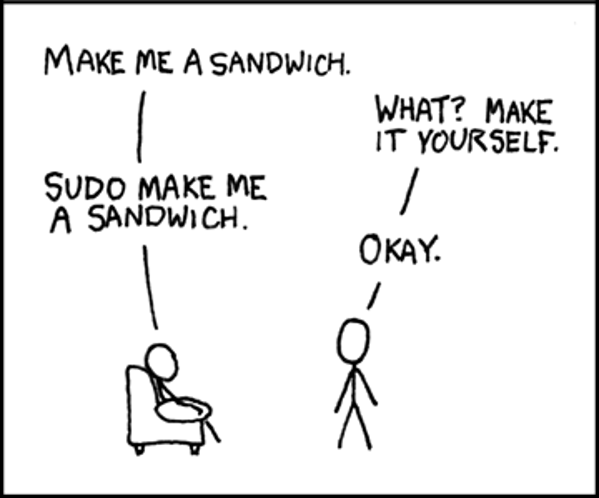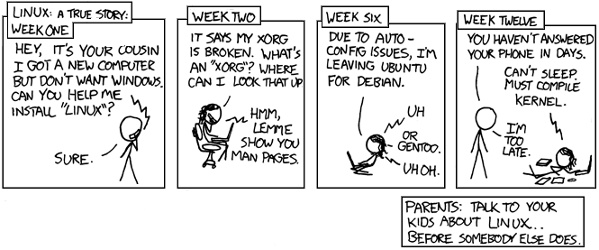On 26 August 1991, Linus Torvalds announced hobby project that was supposed to better than Minix operating systems. He said I am doing a free operating system. Just a hobby and won’t be big or professional like GNU. Linux turns 28 years old, and we are going to celebrate Linux’s birthday by sharing comics in pop culture that made it even more popular.
Linux celebrates 28th birthday
Today, 28 years ago Linus Torvalds announced Linux on comp.os.minix. Here is original email:
Hello everybody out there using minix – I’m doing a (free) operating system (just a hobby, won’t be big and professional like gnu) for 386(486) AT clones. This has been brewing since april, and is starting to get ready. I’d like any feedback on things people like/dislike in minix, as my OS resembles it somewhat (same physical layout of the file-system (due to practical reasons) among other things).
I’ve currently ported bash(1.08) and gcc(1.40), and things seem to work. This implies that I’ll get something practical within a few months, and I’d like to know what features most people would want. Any suggestions are welcome, but I won’t promise I’ll implement them 🙂
1. Sandwich
Linux celebrates 28th birthday and will start with my most favorite comic. On Linux and Unix-like systems, a sysadmin can give all kinds of rights. For example, shut down the system or update packages using sudo command. The sudo let authorized user override various aspects of a system and run commands as the root user.

2. Gentoo Linux cautionary tale
For a long time, GNU/Linux often used as a “hobby” OS against a preinstalled “productivity” OS such as Windows or macOS. However, one needs to install Linux individually. Some Linux distros are user-friendly and recommend for new users. Other advanced distros like Gentoo requires expertise and could quickly take weeks of your time.
3. Linux CLI is love
Linux user’s love their computers and command-line tools as Linux provides all tools to fix problems, but it could take a little bit time, and your date could walk away.

4. Can’t remember the command line flags?
You are not alone. Many of us struggle to remember the order of command-line options. For example, ln command or tar command on Unix/Linux systems can be pain to remember:


5. Letting go relationship to /dev/null
Creating and deleting users is a routing sysadmin task. However, in this comic, a character who has had a romantic relationship ended. He accepts reality by using the userdel command to delete her user account from his Linux computer.

6. To mess up a Linux box, you need to work at it
While some viruses and malware can hurt Linux, in general, Unix-like operating systems macOS and *BSD are far more robust and secure than Windows OS, with fewer exploitable vulnerabilities. However, Linux is free and open source software, which means that anyone can audit the code and fix security bugs. One can always use anti-malware solutions such as ClamAV if desired for Linux.

7. Real Linux does say, “this incident will be reported.”
Where will the incident with the sudo command be reported to? Here:

Here is another twist to sudo command:

Sometimes you gotta start them young:

8. Naming hostname is always hard
There are only two hard things in Computer Science: cache invalidation and naming things. Linux users find it hard to name their servers and computers too. I have many tutorials that explains changing hostname on Linux:

9. Want faster tech support?
Look for the geek who knows a GNU/Linux and talks to her.

As Linux celebrates 28th birthday, we need to remember that RMS played a significant role in creating free software, which gives you the freedom to install and modify the software. He created GPL, emacs, and much more. Strictly speaking, Linux is just kernel. GNU utilities, installer, and management scripts make complete Linux operating system (commonly known as Linux distro). Proprietary software vendor such as Microsoft hated Linux for a long time. However, recently they changed the tone to make money out of Linux running in the cloud.

10. Getting hardware support for Linux
Linux developers and hackers are known to patch the kernel to work with their hardware. The whole free software movement and many drivers created by voluntary users of Linux operating systems. In this comic user assumed that support for a USB port could be similarly patched into his arm to how hardware support can be added to the Linux kernel. That is how Linux and free software culture works.

Conclusion
I am grateful that Linus created Linux kernel and RMS for free software movement. I created nixCraft back in 2000 when there was no stack overflow or anything else for Linux. Anyone who ever worked on Linux knows about nixCraft for sure:

I hope you find these comics and pop culture references useful and humorous. Happy 28th birthday Linux!